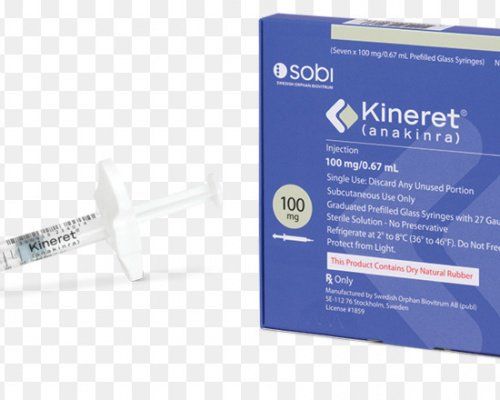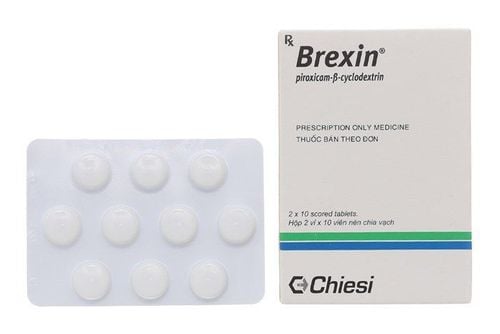This is an automatically translated article.
Mobimed 15mg contains the active ingredient meloxicam belonging to the group of non-steroidal anti-inflammatory drugs (known as NSAIDs) with anti-inflammatory, analgesic and antipyretic effects. Long-term symptomatic treatment of chronic pain in musculoskeletal disorders.
1. Effects of Mobimed 15mg
Mobimed 15 mg is indicated for long-term use in the symptomatic treatment of chronic inflammatory pain in:
Ankylosing spondylitis Inflammation in degenerative joint diseases, joint damage. Rheumatoid arthritis
2. Dosage of Mobimed 15mg
For each medical condition, the patient will be assigned a different dose:
Osteoarthritis: 7.5mg/day. If necessary, in the absence of improvement, the dose can be increased to 15 mg/day. Ankylosing spondylitis, rheumatoid arthritis: 15mg/time/day. The dose may be reduced to 7.5 mg/day, depending on response to treatment. Treatment should be initiated at a dose of 7.5 mg/day in patients at high risk of adverse events. Patients with severe renal failure on hemodialysis should not exceed 7.5mg/day. Safety and effectiveness have not been established in children under 18 years of age. DO NOT USE MORE THAN 15mg/day.
3. Contraindications to Mobimed 15
Mobimed 15mg is contraindicated in the following cases:
Hypersensitivity to meloxicam and any component of the drug or substances with similar effects such as NSAIDs and aspirin. Should not be used in patients with signs of nasal polyposis, asthma, angioedema or urticaria due to other NSAIDs and aspirin. History of gastrointestinal bleeding or perforation with previous use of NSAIDs. Peptic ulcer disease progression. Treatment of pain after coronary artery bypass graft (CABG) surgery. Pregnant women in the last trimester of pregnancy and breastfeeding women. Children under 16 years old. Effects on ability to drive and use machines: There are no specific studies on the ability to drive and use machines. However, when symptoms such as visual disturbances, dizziness and drowsiness are present, driving or operating machinery should be limited.
4. Side effects of Mobimed 15mg
Common: Nausea, vomiting, abdominal pain, diarrhea, dyspepsia, flatulence, anemia, allergies, headache. Uncommon: Leukopenia, thrombocytopenia, dizziness, somnolence, angioedema, increased blood pressure, facial flushing, gastrointestinal bleeding, stomatitis, gastritis, intestinal obstruction, mild elevation of transaminases or bilirubin, increased serum creatinine and urea levels. Rare: Conjunctivitis, tinnitus, photosensitivity skin, Stevens-Johnson syndrome, Lyell syndrome, erythema multiforme, bronchial asthma. Inform your doctor about unwanted effects when using the drug.
5. Mobimed 15 . drug interactions
Mobimed 15 should not be combined with the following drugs:
Other NSAIDs: synergistic effect increases the risk of peptic ulcer and bleeding. Corticosteroids: increased risk of gastrointestinal bleeding and ulceration. Anticoagulants warfarin, heparin, ticlopidine, thrombolytics: NSAIDs increase the risk of bleeding and should be avoided. If the combination cannot be avoided, close monitoring of the effect of the anticoagulant is required. Lithium: Increases blood levels of lithium, so when combining the two drugs, it is necessary to monitor blood levels of lithium. Methotrexate: NSAIDs may decrease renal tubular secretion of methotrexate, resulting in increased plasma concentrations of methotrexate. For this reason, for patients receiving high doses of methotrexate (more than 15 mg/week), concomitant use of NSAIDs is not recommended. In cases where combination therapy is necessary, blood cell counts and renal function must be monitored. Cholestyramine: Cholestyramine accelerates the elimination of meloxicam by disrupting intestinal circulation to increase clearance of meloxicam and decrease the half-life. This interaction is clinically significant. IUD: The contraceptive effectiveness of the IUD is reduced with the use of NSAIDs. Diuretics, ACE inhibitors and Angiotensin-II antagonists: NSAIDs may reduce the effect. May increase the risk of acute renal failure in dehydrated patients and in elderly patients with compromised renal function. Therefore, the combination should be used with caution, especially in the elderly, adequate hydration is required, and renal function should be monitored after treatment. Selective serotonin reuptake inhibitors (SSRIs): Increased risk of gastrointestinal bleeding.
6. Treatment of overdose
Symptoms following acute NSAID overdose are usually limited to coma, somnolence, nausea, vomiting, and epigastric pain, are usually reversible with supportive care, and may occur gastrointestinal bleeding. Severe intoxication may result in hypertension, respiratory failure, acute renal failure, liver dysfunction, coma, convulsions, cardiovascular collapse and cardiac arrest. Anaphylactoid reactions have been reported with the therapeutic use of NSAIDs and may occur after overdose.
Measures for supportive care and symptomatic treatment of patients after overdosage of NSAIDs. Rapid elimination of meloxicam by 4 g of cholestyramine orally three times a day has been demonstrated in a clinical trial.
Please dial HOTLINE for more information or register for an appointment HERE. Download MyVinmec app to make appointments faster and to manage your bookings easily.













